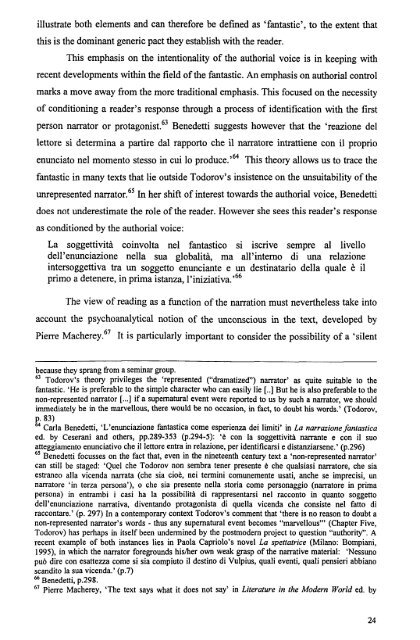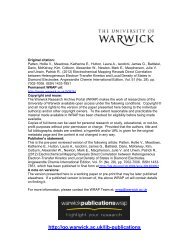Download (13Mb) - WRAP: Warwick Research Archive Portal ...
Download (13Mb) - WRAP: Warwick Research Archive Portal ...
Download (13Mb) - WRAP: Warwick Research Archive Portal ...
You also want an ePaper? Increase the reach of your titles
YUMPU automatically turns print PDFs into web optimized ePapers that Google loves.
illustrate both elements and can therefore be defined as 'fantastic', to the extent that<br />
this is the dominant generic pact they establish with the reader.<br />
This emphasis on the intentionality of the authorial voice is in keeping with<br />
recent developments within the field ofthe fantastic. An emphasis on authorial control<br />
marks a move away from the more traditional emphasis. This focused on the necessity<br />
of conditioning a reader's response through a process of identification with the first<br />
person narrator or protagonist.f Benedetti suggests however that the 'reazione del<br />
lettore si determina a partire dal rapporto che il narratore intrattiene con il proprio<br />
enunciato nel momento stesso in cui 10 produce.,64 This theory allows us to trace the<br />
fantastic in many texts that lie outside Todorov's insistence on the unsuitability ofthe<br />
unrepresented narrator. 65 In her shift of interest towards the authorial voice, Benedetti<br />
does not underestimate the role ofthe reader. However she sees this reader's response<br />
as conditioned by the authorial voice:<br />
La soggettivita coinvolta nel fantastico si iscrive sempre al livello<br />
dell'enunciazione nella sua globalita, rna all'intemo di una relazione<br />
intersoggettiva tra un soggetto enunciante e un destinatario della quale e il<br />
primo a detenere, in prima istanza, I'iniziativa. ,66<br />
The view of reading as a function of the narration must nevertheless take into<br />
account the psychoanalytical notion of the unconscious in the text, developed by<br />
Pierre Macherey.V It is particularly important to consider the possibility of a 'silent<br />
because they sprang from a seminar group.<br />
63 Todorov's theory privileges the 'represented ("dramatized") narrator' as quite suitable to the<br />
fantastic. 'He is preferable to the simple character who can easily lie [..] But he is also preferable to the<br />
non-represented narrator [...] if a supernatural event were reported to us by such a narrator, we should<br />
immediately be in the marvellous, there would be no occasion, in fact, to doubt his words.' (Todorov,<br />
p.83)<br />
64 Carla Benedetti, 'L'enunciazione fantastica come esperienza dei limiti' in La narrazione fantastica<br />
ed. by Ceserani and others, pp.289-353 (p.294-5): 'e con la soggettivita narrante e con il suo<br />
atteggiamento enunciative che illettore entra in relazione, per identificarsi e distanziarsene.' (p.296)<br />
65 Benedetti focusses on the fact that, even in the nineteenth century text a 'non-represented narrator'<br />
can still be staged: 'Quel che Todorov non sembra tener presente e che qualsiasi narratore, che sia<br />
estraneo alla vicenda narrata (che sia cioe, nei termini comunemente usati, anche se imprecisi, un<br />
narratore 'in terza persona'), 0 che sia presente nella storia come personaggio (narratore in prima<br />
persona) in entrambi i casi ha la possibilita di rappresentarsi nel racconto in quanto soggetto<br />
dell' enunciazione narrativa, diventando protagonista di quella vicenda che consiste nel fatto di<br />
raccontare.' (p. 297) In a contemporary context Todorov's comment that 'there is no reason to doubt a<br />
non-represented narrator's words - thus any supernatural event becomes "marvellous'" (Chapter Five,<br />
Todorov) has perhaps in itself been undermined by the postmodern project to question "authority". A<br />
recent example of both instances lies in Paola Capriolo's novel La spettatrice (Milano: Bompiani,<br />
1995), in which the narrator foregrounds his/her own weak grasp ofthe narrative material: 'Nessuno<br />
puo dire con esattezza come si sia compiuto il destine di Vulpius, quali eventi, quali pensieri abbiano<br />
scandito la sua vicenda.' (p.7)<br />
66 Benedetti, p.298.<br />
67 Pierre Macherey, 'The text says what it does not say' in Literature in the Modern World ed. by<br />
24

















